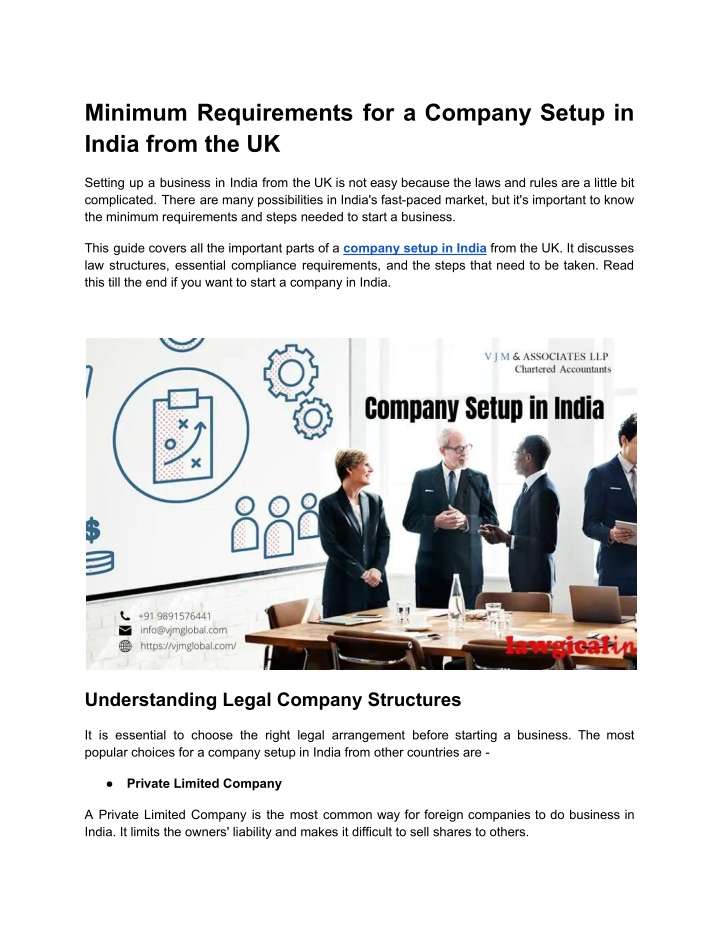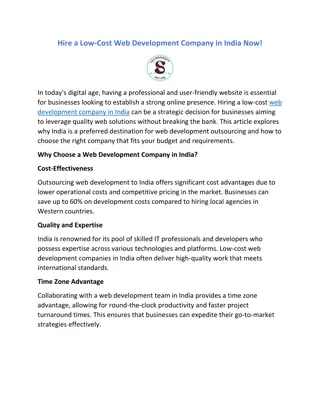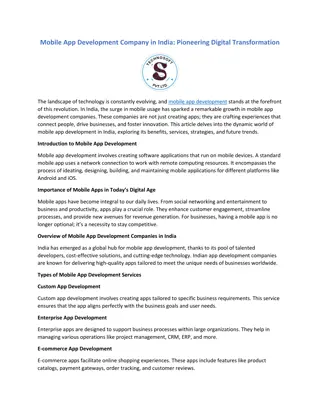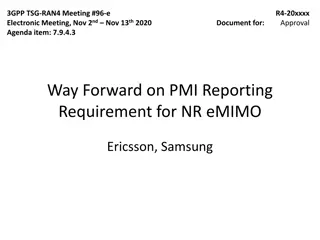
Minimum Requirements for a Company Setup in India from the UK
This guide covers all the important parts of a company setup in India from the UK. It discusses law structures, essential compliance requirements, and the steps that need to be taken. Read this till the end if you want to start a company in India.
Download Presentation

Please find below an Image/Link to download the presentation.
The content on the website is provided AS IS for your information and personal use only. It may not be sold, licensed, or shared on other websites without obtaining consent from the author. If you encounter any issues during the download, it is possible that the publisher has removed the file from their server.
You are allowed to download the files provided on this website for personal or commercial use, subject to the condition that they are used lawfully. All files are the property of their respective owners.
The content on the website is provided AS IS for your information and personal use only. It may not be sold, licensed, or shared on other websites without obtaining consent from the author.
E N D
Presentation Transcript
Minimum Requirements for a Company Setup in India from the UK Setting up a business in India from the UK is not easy because the laws and rules are a little bit complicated. There are many possibilities in India's fast-paced market, but it's important to know the minimum requirements and steps needed to start a business. This guide covers all the important parts of a company setup in India from the UK. It discusses law structures, essential compliance requirements, and the steps that need to be taken. Read this till the end if you want to start a company in India. Understanding Legal Company Structures It is essential to choose the right legal arrangement before starting a business. The most popular choices for a company setup in India from other countries are - Private Limited Company A Private Limited Company is the most common way for foreign companies to do business in India. It limits the owners' liability and makes it difficult to sell shares to others.
Public Limited Company It is good for bigger companies that want to raise money from the public. It gives the persons who want to register a company in India a limited liability and lets anyone buy shares. Liaison Office It is perfect for businesses that want to learn more about the Indian market without doing business there. The parent company and Indian businesses can communicate through it. Branch Office A Branch Office is another company setup in India. It can trade and offer consulting services, but it cannot make things itself (although it can hire someone else to do so). Wholly Owned Subsidiary A wholly owned subsidiary is a company in which a foreign company owns all of its shares. This structure gives the government of India full control over business processes. Needs for Registration and Compliance Once you choose the type of structure, the next step is to register a company in India and ensure it complies with Indian law. Registering with the Ministry of Corporate Affairs (MCA) The Ministry of Corporate Affairs (MCA) is where the process starts. Important steps are: Anyone who wants to be a director must get a Director Identification Number (DIN). Directors need a Digital Signature Certificate (DSC) to sign electronic papers. Use the RUN (Reserve Unique Name) service to make sure the company name you want is available. To incorporate, you need to fill out the SPICe+ (Simplified Proforma for Incorporating Company Electronically Plus) form. Legal Documents For the establishment process of a company setup in India, you need a number of legal documents, such as: Memorandum of Association (MoA) Articles of Association (AoA) Proof of registered office address Identification and address proof of directors and shareholders
Declaration by directors and initial shareholders Permanent Account Number (PAN) and Tax Registration Get a Permanent Account Number (PAN) and a Tax Deduction and Collection Account Number (TAN) from the Income Tax Department after the company is formed. Goods and Services Tax (GST) Registration GSTIN is needed to register a company in India. You need to sign up for GST if your business sells things or provides services. Compliance with RBI Guidelines The Reserve Bank of India (RBI) has rules that foreign companies must follow. These rules include: Filing the Advance Remittance Form (ARF) within 30 days of receiving inward remittance. Issuing shares within 180 days of receiving the investment. Filing the Form FC-GPR (Foreign Collaboration - General Permission Route) for reporting foreign direct investment (FDI) to the RBI. Business Permits and Licenses You might need more permits and licenses for your business, depending on what it is. Some common examples are: Importer Exporter Code (IEC) for businesses involved in import and export. Sector-specific licenses (e.g., pharmaceutical, food, telecommunications). Banking and Financial Setup Opening a Bank Account Open a bank account in India. Most banks require the following: Incorporation documents PAN card of the company Proof of registered office KYC documents of directors and authorized signatories
Repatriation of Profits Find out what the rules are for sending income back to the UK. After paying taxes and following all the rules, profits can be sent back to the country where they were made. Employment and HR Compliance Hiring Employees Indian labor rules must be followed when hiring local workers. Important things to think about are: Employment Contracts: Make sure the rules of the job are clear for a company setup in India. Work Visas: Make sure that all of your foreign employees have the right work visas. Employee Benefits and Compliance Ensure compliance with statutory requirements such as: Provident Fund (PF) Employee State Insurance (ESI) Professional Tax Gratuity and leave entitlements Payroll Processing Set up a strong payroll system to register a company in India so that you can easily handle salaries, perks, and deductions. Understanding Cultural and Operational Dynamics Understanding Cultures Being sensitive to and aware of other cultures is important for running a good business. Learning about the rules of business behavior, how things are organized, and how people talk to each other can greatly affect your business relationships and processes. Understanding Finances Hire local law and financial experts to help you navigate the rules quickly. Their knowledge can help you ensure that you follow the rules and lower the risks associated with starting and running a business in India.
Conclusion Starting a company setup in India from the UK is a complicated process that needs to be carefully planned and followed by many laws and rules. In order to run a successful business in India, you need to know the legal structure of licenses and be aware of cultural differences. Hiring professional advisors like VJM Global can make the process even easier. Professionals from such organizations ensure that your business is in compliance with the rules and ready to grow in the exciting Indian market.






















